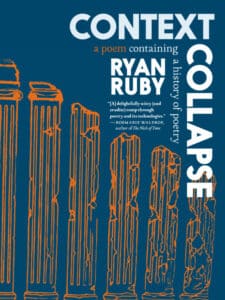
Has Ryan Ruby really written a critical literary essay as a poem?
I’ve never read a poem quite like Context Collapse: A Poem Containing a History of Poetry by Ryan Ruby. I would expect that you haven’t either. Written in unrhymed pentameter, this is a poem about the history of poetry. It is also a poem about literary theory. It’s a poem that reads like what you might find in an academic journal on linguistics or communication technology. In other words, unless you’re familiar with literary theory and can translate academese, you’re going to find this poem a tough go.
I admit it: I found it a tough go. If I pretended anything else, I would be posing. Remove the returns after each line, turning it into paragraphs, and you have an academic paper.
That said, I picked up enough to know that Context Collapse is deliberately written as a mock academic paper. It’s something of an inside joke, and yet it’s not. You don’t include nearly 150 footnotes with a satire. You don’t have a 14-page bibliography of real works if you’re just trying to be funny.
Despite the subtitle, Ruby doesn’t exactly offer a full history of poetry. A few eras are left out, which I noticed when the text leapfrogged from the ancient Greeks to the era of Dante in Italy, and then pole-vaulted over Chaucer and Shakespeare. It may be more the history of the idea of poetry, or, as Ruby himself explains in the introduction, the idea of poetry as a media technology. I initially found that idea as jarring, until I considered that, however jarring it is, poetry is a media technology, and it has indeed changed, and changed dramatically, over time, from oral to printed word to Instagram and TikTok phenomenon.
Here’s a short excerpt from the seven-chapter, 120-page poem (an excerpt relatively easy to follow):

In fact, contra McCaffery, there was no
Crisis of the sin, only a crisis
Of semiotic overproduction.
The “mimeo revolution” may have
Democratized access to the printing press,
Dramatically reducing the power
Of traditional gatekeepers, but lyric,
Which has the lowest barrier to entry
Of any art form in any medium,
Is, for this reason, particularly
Vulnerable to sharp fluctuations
In supply. Making a back-of-the-napkin
Calculation, Craig Dworkin estimates
That by the first decade of the twenty-first
Century, over one thousand book-length
Collections of “serious” poetry
Were being cranked out in the US per
Annum. Combined with contemporaneous
Statistics showing that submitters to
Print magazines reliably outnumber
Their subscribers by a factor of ten,
It becomes impossible not to conclude,
As he does, that many more people write
Poetry than read it…
I haven’t included them, but that excerpt contains four footnotes.
Ruby discusses how poetry has developed over the centuries, becoming almost exclusively the domain of academia in the mid-1900s (there are reasons for that). And it looked like it would stay that way (academics still think it does) until the advent of social media and especially Instagram and TikTok. Those two social media have exposed millions of people to poetry and sold millions of copies of poetry books. Readers and writers of poetry, starting about 2010, began to grow dramatically in numbers, reversing poetry’s long decline.

Ryan Ruby
And, yes, Ruby includes sections on recent and contemporary literary theory, like the New Criticism, formalism, and deconstruction, including Marxist influences and what sounds like interpreting poetry in the context of economic as well as literary theory. (As I indicated, there are places in the poem where I simply got lost.)
Ruby has also published a novel, The Zero and The One. His essays, articles, and reviews have been published by a wide array of literary, academic, and general publications, including New Literary History, Sidecar, Liberties Journal, NYRB Classics, The Nation, The New Yorker, Harpers, Poetry Magazine, and others. Context Collapse was a finalist for the 2020 National Poetry Series and a semi-finalist for the 2020 Tomaz Salamun Prize. Ruby also received the 2023 Silvers Prize for Literary Criticism and the 2019 Einstein Fellowship from the Einstein Forum. He lives with his family in Berlin, where he is on the faculty of the Berlin Writers’ Workshop.
To answer the question I posed at the start, yes, Ryan Ruby really has written a poem that is a critical literary essay. As he says, this type of verse criticism was common in the 17th and 18th centuries, but we haven’t really seen the likes of it since then. Context Collapse may be a one off or a throwback, and it does demonstrate the incredible breadth of knowledge of it author. But you also have the suspicion the whole time while reading it that the poet here is grinning while he writes.
Related:
A Reading from Context Collapse with Ryan Ruby and Daniel Liu at ICI Berlin
The Poets of Instagram: r.h. Sin and I Hope This Reaches Her in Time
Photo by Cristian Stefanescu, Creative Commons, via Flickr. Post by Glynn Young.
Browse more book reviews
How to Read a Poem uses images like the mouse, the hive, the switch (from the Billy Collins poem)—to guide readers into new ways of understanding poems. Anthology included.
“I require all our incoming poetry students—in the MFA I direct—to buy and read this book.”
—Jeanetta Calhoun Mish
- Poets and Poems: Peter Murphy and “You Too Were Once on Fire” - October 14, 2025
- “Your Accent! You Can’t Be from New Orleans!” - October 9, 2025
- Poets and Poems: Donna Vorreyer and “Unrivered” - October 7, 2025


Leave a Reply